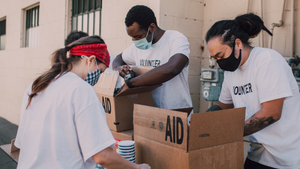Tech companies partner with Texas city to bring connectivity to five underserved communities
August 19, 2022

A few years ago, the issue of equity in broadband access and connectivity was suddenly thrust to the forefront of public discourse when news of schoolchildren logging into remote classrooms from library parking lots and the local McDonald’s broke headlines.
Since then, public and private organizations across the country have been working hard to make sure everyone has equal online access. Recently, for example, a joint connectivity endeavor will see an estimated 40,000 underserved residents in Fort Worth, Texas brought online.
Technology brand Cisco and Presidio, an information technology solutions company, have partnered with Fort Worth to expand free Wi-Fi access in neighborhoods with limited connectivity through an initiative called “Neighborhood Wi-Fi,” according to a statement about the project. The project leverages Cisco’s Ultra-Reliable Wireless Backhaul—low-latency wireless backhaul for operational technology and information technology mobility and fixed applications. The technology provides quick, reliable and secure connectivity in support of the city’s long-term strategy for fiber buildout.
“Just like power and water, the Internet is a basic necessity for our communities to be successful. By implementing CFW-Neighborhood Wi-Fi in these five neighborhoods, we are bridging a steep digital divide in parts of our City that need it the most, empowering more residents to complete job applications, do research for schoolwork, attend virtual doctor appointments, complete applications for services, and so much more,” said Fort Worth Mayor Mattie Parker. “This is a huge step in the right direction, and the City is committed to executing on more long-term projects that will increase Internet accessibility for more residents.”
Efforts will be focused in five Fort Worth neighborhoods—Ash Crescent, Como, Northside, Rosemon and Stop Six—identified because of their need for better connectivity as part of the city’s Neighborhood Improvement Strategy, which devotes additional resources to the neighborhoods most in need. All of the neighborhoods selected have between 55 and 90 percent broadband saturation. Notably, there’s an estimated 60,000 people with limited or poor access to broadband currently residing in the city. The project, which will expand the city’s existing CFW-Guest Wi-Fi network that is currently free and available at libraries and community centers, is expected to be completed in the fall.
The partnership is a good example of the ways public organizations are working together with private companies to meet the needs of constituents.
“The value of technology like Cisco Ultra-Reliable Wireless Backhaul is that it can provide connectivity to communities relatively quickly and ensure neighborhoods are not left behind as we work toward delivering city fiber buildout,” said Kevin Gunn, chief technology officer at Fort Worth. “Cisco and Presidio’s ability to adapt to our needs, tailor the technology solutions, and co-create alongside us demonstrates the power of public and private sector partnership.”
To that end, Gary DePreta, area vice president for state, local governments, and education at Cisco said it’s up to leaders of private and public organizations “to work together to solve historic digital inequities.”







